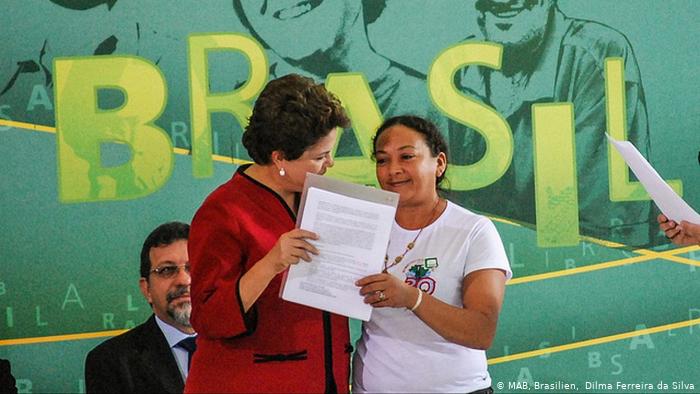Source Racismo Ambiental
Dilma Ferreira Silva, 47, was murdered along with her husband, Claudionor Costa da Silva, 42, and Hilton Lopes, 38, a friend of the couple. The crime occurred in Dilma’s house, in the settlement Salvador Allende, in the rural area of Baião, between Thursday and Friday Friday (03/22/19/19). Dilma was affected by the Tucuruí hydroelectric dam and was part of the coordination of the Movement of Dam Affected People (MAB) in the region.
MAB
According to the information collected at the site, at around 9 pm Thursday (March 21), five people arrived on three bikes at Dilma’s home, where she had a small shop. Shortly afterwards, the neighbours heard loud music coming from the place, which continued all night, and they found it strange, since this was not all usual for the couple.
The next day, in the morning, the school bus came to fetch Dilma, since she worked as a monitor at the community school. When they arrived at the place, they found the whole house turned upside down and the three bodies. They were tied up, gagged and, by all accounts, shot dead.
Apparently Dilma was tortured and then her throat was cut. The motivation for the crime is not yet known. Although there has been a long standing pattern of threats against human rights defenders in the area, MAB had no news that Dilma was specifically threatened. The area where she lived had been the focus of a land occupation, but that had already been regularised by INCRA. The police are treating the crime as a targeted killing and as of Saturday afternoon (03/23), more than 36 hours after the incident, no suspect had been arrested.
According to monitoring by the Pastoral Land Commission (CPT), Dilma was the first land rights activist to be assassinated in the Amazon in 2019. Dilma and her family were affected by the construction of the Tucuruí power plant, Brazil’s third largest hydroelectric power plant, second in scale only to the Itaipu and Belo Monte dams, also in Pará. The hydroelectric plant was inaugurated in 1984, during the military dictatorship. Around 40 thousand people were affected in the various phases of implementation of the hydroelectric plant.
Dilma Silva had a life of struggle — as a woman, a black woman, a northeastern woman, a migrant, a riverine woman – s situation that was aggravated by the violence associated with the construction of the large dam. Tucuruí has become an emblematic example of the destruction caused by the model of energy development used in the Amazon. This issue is referred to in the report of the National Human Rights Council (CNDH) of 2010, which identified the existence of a systematic pattern of human rights violations in the construction of dams in Brazil. «The plant, when it opened the floodgates, took everything,» said Dilma in an interview made in 2011 by portal Amazônia.org.
While Tucuruí produces great wealth, many of the stricken families do not even have access to electricity. The majority of those affected did not receive any kind of recognition or compensation, and therefore have been fighting for more than 30 years. It is in this context that Dilma was involved in the organisation of families affected by dams. Tucuruí is also one of the main cases in Brazil of judicial criminalization of those affected by dams that fight for their rights, with criminal prosecutions being taken against leaders in the region.
Dilma was MAB’s regional coordinator since 2005. In 2011, she participated in the National Meeting of Women Affected by Dams, which brought together more than 500 victims in Brasilia. At the time, the women of the MAB were received by President Dilma Rousseff. Dilma Silva was responsible for handing over to the president the letter with the demands of the victims, which included the creation of a National Policy on the Rights of Those Affected by Dams (PNAB) and mechanisms to protect the lives of working-class women.
The Salvador Allende settlement, where Dilma lived, is located at km 50 of Highway BR-422 (Transcametá), which crosses the municipality of Baião, in the northeast of Pará. The settlement is the result of the occupation of the Piratininga farm, carried out in 2011 by the Movement of Landless Rural Workers (MST). After an eviction by gunmen, MAB joined the MST and the Federation of Workers in Family Farming (Fetraf) in the organization of families, who occupied the INCRA offices as a form of protest.
The area was claimed by farmer Renato Lima. Upon finding that he did not have documentation for the land, INCRA began the negotiations to have the land designated for the agrarian reform programme and started the process to allocate plots of land. Dilma had received her plot of land and devoted herself to farming the land and organising the local branch of MAB. «What gives us strength is the Movement; is the struggle to not let it happen to others, «said Dilma in an interview with the Amazônia.org portal in 2011.
